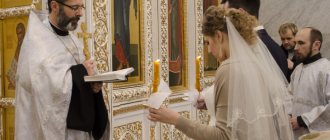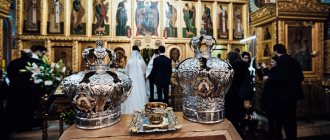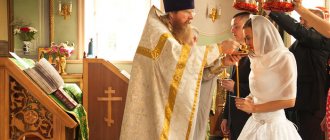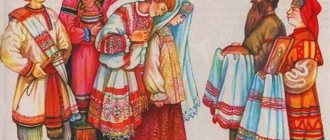The Spirit of the Lord prompts and teaches the one on whom it dwells. He points out what righteousness is and how to maintain and increase it: “You don’t need anyone to teach you. But this anointing itself teaches you...” The word “anointed” can be found very often in the Bible. Throughout human history, various nations have had many of God's anointed ones. These were mentors, leaders, leaders, kings. So who is God's anointed one? This is a deep philosophical question that we will have to grapple with today.
Who is the Lord's anointed?
The Lord's anointed person represents God's chosen one who is best suited to rule the Orthodox country out of many other people according to Divine foreknowledge. He is a chosen servant of God, the Lord imparts his grace to him and gives gifts to help him govern the country through the church rites of anointing for the kingdom. Thus, God’s anointed one has a task before the Lord, which is to govern the country in such a way that it helps all the people to quickly and easily save their souls from destruction, to become closer to the Kingdom of Heaven through faithful and sacrificial service to the king, that is, the anointed one of God.
Separation of powers
Only after overcoming the iconoclastic crisis in the 9th century was the Byzantine Empire able to come to the distinction between the earthly, limited (i.e., the kingdom), and the sacred, eternal (i.e., the Church). If earlier emperors tended to absolutize the state, as if reflecting the “divine order” on earth, now they began to treat their empire as a “servant of Christ.” This was manifested in the images of emperors: until the 8th century we see triumphant emperors, rulers who do not know the limits of their power, although outwardly Christian, then we see an emperor bowing in the awareness of the limitations of his power before Christ, the true king. The Emperor begins to see the head of the Church next to him as an independent ruler, equal to him in his significance for the Christian empire - like Aaron next to Moses (even such an iconographic plot appears: the emperor and the patriarch in front of the Tabernacle of the Covenant). The emperor begins to understand that his ministry is sacred in the Gospel, the foundations of a true symphony of powers are laid (the symbol of which is the Byzantine double-headed eagle, the two heads of which signified the state and the Church). However, the roles of the head of state and the head of the Church in this symphony were not immediately determined. Constantine also called himself an “external bishop of the Church” (although this concerned his actual external concern for the Church; his definition of himself in the church structure is indicative). Subsequently, even some features of a clergyman were assigned to the emperor. In late Byzantium, the emperor participated in the liturgy, at the great entrance he walked in front of everyone, at a certain moment of the service he, like a deacon, incense the throne crosswise, then the patriarch, then the patriarch incense him. During the coronation (in late Byzantium and in Russia, starting with Alexei Mikhailovich), the emperor (tsar) entered the altar through the royal doors and received communion together with the priests in the altar (immediately after the patriarch, before the bishops and priests) - with the royal doors open. However, the Russian tsars and emperors who followed Alexei Mikhailovich received communion at the altar only at the coronation. In the 18th century, this tradition acquired unexpected forms: Empresses Anna Ioannovna (1730), Elizaveta Petrovna (1742) and Ekaterina Alekseevna (1762) also entered the altar during their coronation and took communion like priests at the throne. At the same time, for example, Metropolitan Feofan Prokopovich literally forced the embarrassed Anna Ioannovna to take the Eucharistic cup in her hands and take communion from it herself. Beginning with the coronation of Paul in 1797, empresses were crowned kings and were anointed only together with their husbands, receiving communion as laymen, outside the altar. Metropolitan Paisius Ligarid (17th century) discussed the spiritual component of the tsar’s “priesthood.” Speaking about the ideal symphony of powers, Paisius noted: “The priesthood reigns over spiritual affairs; the kingdom has sacred authority over the civilians.” That is, the king treats his royal service with sacred trepidation - so as not to destroy the Christian soul, but to provide it with all kinds of care and mercy - as befits a priest. The king is not a blind guardian of the law, but a merciful sovereign, on whom the words of the prophet and king David come true: “Mercy and truth meet (meet)” (Ps. 85:11). It is no coincidence that the following proverbs about tsars were born among the Russian people: “God is rich in mercy, the sovereign is rich in pity”, “Whoever is not a sinner to God is not to blame for the tsar!” etc. Of course, to be merciful is the calling of every Christian. But the king was appointed by God and anointed as king to remind us that this is possible in worldly life.
Grace of the Sovereign
God's anointed (king) has the grace to comprehend goals, ways to solve modern life issues, as well as those that brighten the distant future of the country. The vital issues of the people do not always coincide with the requirements of the Orthodox state, the goal of which is the salvation of souls both now and in the future. Sometimes the needs of the present and the distant future are opposite, in this case only the monarch, the anointed of God, can solve this problem in the best way. And for everyone's benefit. This is the grace of the sovereign and the presentation of the Lord to God’s anointed one.
Proof of this truth
If God is Virtuous, he cares about the welfare of the people; if God is Omniscient, he predicts which of the people can best rule the country; if the Lord is Almighty, he makes sure that the person he chooses and his descendants are the most fit to rule at all times and in every case of life. Establishing the dynasty of kings, God provides it with help and guardianship, directing the monarch to make the right decisions in difficult times. Thus, the Lord knows that the faithful service of His anointed will give positive results, improve the quality of life of the people, and create good conditions for the salvation of the souls of each of the Orthodox people. The Orthodox Church teaches us that the Lord is Virtue, he is omniscient and omnipotent. Therefore, it is he who chooses the anointed one who will rule the state.
Anointing in the Bible
Anointing to the throne is a rite in which the monarch who ascends the throne is anointed with oil (olive oil) and myrrh (an aromatic oil made from several herbs) in order to present him with the gifts of the Lord for the proper management of the state. The first example from the Bible is the story of Aaron when he was elevated to the office of high priest. Repeatedly in this book there are indications of the anointing of monarchs, therefore later, upon the accession of the king to the throne, the ceremony of anointing for the kingdom was always carried out, when the monarch received the blessing of heaven.
On the sacred ceremony of the wedding and anointing of kings to the kingdom
Article by A.V. Gorsky. Pisana in 1856
Tsar-loving Russia deeply feels and expresses with overwhelming solemnity the joy of its Tsar on the day of his sacred crowning. And in the high light the royal majesty of God’s anointed appears on this wedding day.
In the sanctuary of God, among the elected members of the state, sovereign power, based on the law of succession to the throne, is sealed by sacred rites; the Autocrat of a powerful monarchy receives the blessing from the King of Kings in order to be a living instrument of God’s providence, a servant of God. By the sacred anointing, the spiritual strength of God's chosen one is renewed, so that he can bear the burden of great service, so that through his direction in the earthly kingdom the citizens of the heavenly kingdom are prepared. A visible participant in the royal power of Him, to Whom
all power in heaven and on earth was given
, approaches the throne of the Almighty and becomes the closest participant in the Divine meal.
Imagining the significance of the sacred wedding and anointing of our Orthodox kings, we involuntarily feel the desire to explain to ourselves the beginning and origin of this institution of the Orthodox Church and the Orthodox state.
For this we need to turn to the institutions of the Greek Church and Empire and to the ancient national monuments.
1.
The times of the first Christian emperors do not provide any indication of special church rites upon their accession to the throne. This is explained, among other things, by the consideration that the first sovereign patrons of the church ascended the throne even before receiving holy baptism. only some hint of church rituals has been preserved in the legend about Emperor Theodosius the Great. Church historian, bl. Theodoret, Bishop of Cyrus, narrates that when Theodosius, after the famous victories over the Goths, appeared at the court of Emperor Gratian, then, as a sign of his reign, he saw in a dream that St. Meletius, Patriarch of Atioch, clothed him with royal purple and placed a crown on him. This circumstance would hardly have been noticed by history if St. Meletius did not actually take part in the crowning of Theodosius. True, Theodoret himself notes that Theodosius received signs of royal dignity from Gratian1: but having been baptized in Solun and then arriving in Constantinople, he could also receive a church blessing for the feat of reign from St. Meletius, who then, at the head of the second ecumenical council, was engaged in organizing the affairs of Orthodoxy in Constantinople.
The royal wedding then was not separate from the accession to the throne
, or
from being proclaimed emperor
. In this haste of coronation and in other circumstances that accompanied it, one can discern traces of the custom of those times when accession to the throne was associated with the vague movement of the Praetorians.
Here are some features from the coronation rites of the Eastern emperors, in the fifth and sixth centuries.
After the death of Marcian, Leo was elected to the throne by the general consent of the Senate (457). The proclamation of his election was to take place on the vast Field of Mars, in the presence of all military and civil officials and Patriarch Anatoly. Countless crowds of people and troops gathered here with them. Banners and banners, as a sign of grief over the deprivation of the emperor, lay thrown to the ground. Voices began to be heard in the meeting: “God hear, we pray to you, let Leo be king.” -Leo also appeared. They elevated him to a higher place. Banners and banners immediately rose from the ground. Greetings thundered from everywhere: “Leo Augustus, God has given you. May God protect you. Let the Lion reign for many years." Then, the newly elected king, surrounded by closed ranks of soldiers, was dressed in royal clothes, and then they placed a diadem on him. In such decoration, with a shield and a spear in his hands, he again appeared to the people and made a speech to them, in which he promised tireless activity in the government and announced his favors to the troops. The ancient description of these rites2 does not say anything about church prayer when conferring the distinctions of royal dignity: but the presence of Patriarch Anatoly at this suggests that he took part in this, corresponding to his rank. At the end of these rituals, the emperor also marched into the city. On the way, he brought thanks to the Lord God, first in the camp church, then in the famous church of St. John the Baptist, where his honest head was kept, and finally, in the great church of Constantinople. When entering the temple, the emperor usually took off his crown each time; and in the church of St. John the Baptist and in the great church, placing it on St. the throne, at the same time, brought its gifts to the sanctuary, which consisted of church utensils. In the great church he listened to the liturgy, and at the end of the prayer the patriarch himself placed a crown on his head.
In a similar way, the election and crowning of Emperor Anastasius (491?) took place, only not on the Field of Mars, but in the hippodrome, for greater visibility. First, he was raised on a shield; then in one of the palace chambers he put on the royal decorations: a mantle and a crown. At the same time, it is noted in the description that Patriarch Euthymius prayed and sang: Lord, have mercy. After the coronation, Anastasius also brought thanksgiving to the Lord in the great church, entering it without a crown; brought his crown into the sanctuary and honored the church with his gifts3. A feature of Anastasyev’s coronation, which was retained during the wedding of subsequent emperors, was that, before the crowning of the kingdom, the patriarch recognized it as necessary to ask the newly elected Sovereign for a confession of faith and a promise to preserve Orthodoxy on the throne, and Anastasy fulfilled what was required4.
Anastasia's successor, Justin, was also proclaimed emperor at the Hippodrome (518). In the presence of Patriarch John and all the ranks, they raised him on a shield; then, in the ranks of the soldiers, he was clothed in royal clothes, and the patriarch laid a crown on him5.
Justinian the Great, due to the illness of Emperor Justin, was proclaimed emperor in the palace on Maundy Thursday, and the coronation took place on the first day of St. Easter (527). The modern description directly states that the bishop was present, i.e. Patriarch of Constantinople; he prayed and laid a crown on Justinian6.
These were the characteristics of the wedding ceremony of Greek emperors for subsequent times, as the Greek chronicles show. Only more often the wedding took place not on the field, or in the hippodrome, or in the palace, but in the temple. Preferably, sovereigns were crowned in the magnificent church of St. created by Justinian. Sophia, but sometimes also in other churches of Constantinople. Emperor Phocas was crowned in the church of St. John the Baptist7. Heraclius himself was crowned8 and crowned his son Heraclius in the court church of St. Stefana9.
The reigning sovereign usually crowned his wife, placing the crown on her himself. This is how Emperor Justin I crowned his wife Lupicia, who at the coronation was renamed Euphemia10, Justin II - Sophia11, Tiberius - Anastasia12, Phocas - Leontia13.
Often, even during the life of the emperor, we placed a crown on the heir to the throne, despite his youth and even infancy. Sometimes this honor was shared with the father by not one, but two and three of his sons. So Emperor Basil the Macedonian crowned his children Constantine, Leo and Alexander14. The sovereign laid the crown on his children himself, with the assistance of the patriarch, who performed the prayer. Emperor Constantine, the restorer of icon veneration, was crowned for another five years at the hippodrome. The Patriarch said a prayer, and Constantine’s father Leo laid a crown on him15.
In the 10th century, when the rites of various rites performed at the court of Constantinople were collected, the sacred wedding of the kings was given this form: the emperor enters the church of St. Sophia together with the patriarch. In the golden gates leading from the vestibule to the temple, he lights candles; goes to salty; prays before the holy gates and, together with the patriarch, ascends to the pulpit. Here the royal purple and crown are already prepared on a special table. The Patriarch prays over the purple and, at the end of the prayer, the closest officials of the court place it on the sovereign. Then he says a prayer over the crown and places it on the sovereign’s head. At the same time, the people exclaim Holy, Holy, Holy. Glory to God in the highest and peace on earth.
After the threefold proclamation of this doxology, there follows the proclamation of many years to the newly crowned king. Then the crowned sovereign returns to his throne and receives worship from all ranks. And the rest, - added in the order of rites, - as regards the supper of love and communion, is performed according to the custom of the holidays16, i.e. both on great holidays and on the day of coronation, the emperor communed with St. secrets, and a meal was held at court for the highest dignitaries and the patriarch.
On the same basis, the oldest church order of royal weddings in Greek that has come down to us is affirmed. It's short; consists of only two prayers said by the patriarch. Both of these prayers were included in the rites for the coronation of Russian sovereigns. After the first prayer, the purple is placed on the king, after the second - the crown. Following the coronation, the rites mention the communion of the presanctified saints. gifts and the shouting of the people: glory to God in the highest
. The order of rank also indicates some features in the coronation of the emperor's wife or their children. The crown is placed in them not by the patriarch himself, but by the emperor, to whom the patriarch gives it with his blessing17).
But neither in the chronicles, nor in the court rites for the coronation of Greek emperors, nor in the rites of church ceremonies is there any mention of the anointing of the crowned person with St. peace from the patriarch.
However, in the 10th century we also find mention of the anointing of Greek kings, precisely in the conciliar act of the Church of Constantinople, under Patriarch St. Polyevkte. Some words from this decree are quoted by the interpreter of church rules Theodore Balsamon, Patriarch of Antioch here18. Here, in terms of its effect, the anointing of kings is compared with chrismation, which everyone is awarded according to St. baptism After this, the Greek chroniclers, speaking about the accession of sovereigns to the throne, mention anointing along with the coronation, although not always. This is how Nikita Choniates speaks about the anointing of St. peace of Emperor Manuel Komnenos from Patriarch Michael19; Nicephorus Grigora about the anointing and wedding of the Nicene sovereign Theodore Laskar20; George Pachimer - about the anointing of Andronikov’s son Mikhail21
Characteristics of the Anointing
Anointing is a blessing from heaven. It is given not for one’s own needs, but to serve the Almighty. This is the power that is given to change for the better, for the ability to bear spiritual fruit. The fruit, that is, the end result, is of great importance. The anointing is given to “ripen the fruit.” The reward from above will be given only for the fruits, and not for the anointing itself. Regardless of the amount of anointing, the reward will be given according to the percentage of fruit produced, so whoever has been given a lot of anointing will be asked for a lot. And God's anointed must bring 100% positive results.
Anointing of Apostle Peter
This knowledge is usually called revelation from God: “Then Jesus answered and said to him: BLESSED ARE YOU, SIMON, son of Jonah, FOR HAVE NOT FLESH AND BLOOD REVEALED THIS TO YOU, BUT MY FATHER who is in heaven” (Matthew 16:17)
The word "opened" in Greek is "ἀποκαλύπτω - apokalupto." Means: “To reveal what was previously hidden.”
Jesus Christ, speaking about the revelation given to Peter, called him happy. It is true happiness to receive revelations from God! And these revelations give us the true blessing of God. A blessing that is eternal and does not fade with time.
THE REVELATIONS THAT THE HOLY SPIRIT GIVES TO US ARE SPIRITUAL KNOWLEDGE OF GOD'S TRUTHS. THEY ARE MORE IMPORTANT THAN GENERAL KNOWLEDGE OF THE BIBLE! BECAUSE THEY ARE FILLED NOT JUST WITH INFORMATION, BUT WITH LIVING FAITH.
My prayer is that whenever we read the Bible, the Holy Spirit will give us revelation to believe in Jesus Christ!
Monarch and church
A minister of the church, the patriarch, cannot rule the people of the state. If he proclaims himself king, he will desecrate the purity of faith, since he recognizes the right of those who falsely believe in the Lord to the salvation of souls. Therefore, the sovereign is superior to the patriarch; Orthodox canons give him the power to appoint and remove the patriarch and bishops. God's anointed one is responsible before God; he is not subject to human judgment.
Russian Orthodox Tsar
After the rite of anointing, when the holy spirit presents the gifts of the Lord to the sovereign, the Russian Orthodox Tsar becomes the so-called husband of his people, and the people figuratively become his wife. For this reason, the coronation is called the “crowning of the kingdom.” Thus, “marital relations” arise between the king and his subjects, which in Orthodoxy must proceed strictly according to the commandments. This means that in God there must be both a monarch and a people. Neither a king can exist without a people, nor a people without a king in the Lord. So, we see the construction of a line of power from the Almighty to the people through the anointed one - the monarch. A king can save his people from sin by directing its vector towards himself, if it is the will of God, the consent of the sovereign himself and the absence of such sin on the monarch himself.
Pagan atavism
In the Old Testament, the anointing was performed by a prophet or high priest. For anointing, fragrant myrrh (anointing oil) was used, prepared from cinnamon, myrrh, cassia, oil and reed (see Ex. 30:22). From a horn or other vessel it was poured onto the king’s head (see 1 Kings 10:1; 16:12-13; 1 Kings 1:39). In the New Testament, all Christians have an anointing from the Lord. After all, Christ Himself is the Anointed One, on whom the gifts of the High Priest, the Prophet and the King rest to the fullest degree. He was “anointed... by God with the Holy Spirit” (Acts 10:38). And from the Father, Christ on the day of Holy Pentecost brought into the world the same Holy Spirit, who, descending on all Christians, makes them “kings and priests” (Rev. 1: 6), “a chosen race, a royal priesthood, a holy nation” (1 Peter 2:9). Each person receives the Gifts of the Holy Spirit in the sacrament of baptism and confirmation. As Tertullian later wrote, Christians bear the name of Christ (сristi), precisely because they are anointed with the Holy Myrrh (Chrisma). The height of the Christian vocation was emphasized by a decisive separation from the world, which lies in evil and is at enmity with Christ and His Church. In the first centuries of the life of the Church, the world was firmly associated with the Roman Empire, with the Roman state. During times of persecution, Christians were characterized by a strong conviction in the truth and immutability of the Gospel words of Christ: “... I am the King... My kingdom is not of this world; If My kingdom were of this world, then My servants would fight for Me, so that I would not be betrayed... but now My kingdom is not from here” (John 18:37). After the conversion of the Roman Emperor Constantine and his issuance of the Edict of Milan (313, the legalization of the Christian faith), suddenly everything began to change. The conversion of Constantine was perceived by many as a manifestation of the cosmic victory of Christ over the “prince of this world” - after all, the state that had hitherto been the main bearer of Antichrist’s malice against the Church bowed before Christ. As a result, the Church faced a number of serious problems. In 380, Emperor Theodosius proclaimed Christianity the state religion of the Roman Empire. An analogy with the Old Testament theocracy (as under King David) suggested itself. But many Christian emperors of Rome, and later of Constantinople, experienced the ongoing impact of the ideology of the Roman pre-Christian theocracy, when any actions of the emperor were justified by the fact that he was a messenger from heaven and would always remain so. The state at that time sought to include the Church without changing significantly, without truly being imbued with the ideals of a Kingdom that is not of this world. Some emperors were overcome by the conviction that the Lord had handed them the kingdom, commanding them to “shepherd the faithful flock of Christ following the example of Peter, the head of the Apostles” (“Eclogue” of Emperor Leo III, first half of the 8th century). That is, it turned out that the kingdom was already identical with the Church, the emperor with the priest; however, earthly state funds cannot be identical to grace-filled church funds!
People and Lord
God does not deny the existence of another source of power, different from himself, power from the people as a result of their free choice. The Lord will not object if a person chooses life and power without the Almighty. This is why not all authority is given by God. The unity of the Lord and man always comes through the anointed one, whose absence makes it impossible to receive grace. If the holy spirit has not touched the anointed one, the Almighty leaves the people to their fate, without His support.
The Truth of the Kingship of God's Anointed One
The anointed one of God is the personification of Jesus on earth, the God-given savior-messiah. With his hands, the Almighty saves the chosen people and the earthly Church from destruction by Satan, both spiritual and physical. He personifies a living instrument in the hands of the Lord. It is through the hands of the king that God protects his heritage from enemies who kill body and soul, and keeps him from sins, using both the power of the word and the power of the sword. The Church says that we need to pray for the anointed king, since this is the Christian duty of all people. If you reject God's rightful anointed one, you will not be able to perform the act of faith to reject Satan. The absence of prayer for the chosen one of the Lord is the path to the Antichrist. Anyone who rejects God’s anointed falls into the clutches of Satan, who with his own hands will create a parody of the Universal Orthodox Empire, that is, the kingdom of the Antichrist. The state and its people who believed and accepted their king are destined for resurrection and victory over all enemies.
Thus, the anointed one of God is the king of the people chosen by the Most High. He is enthroned to the throne of the state whose people the Lord has chosen, and represents the Head of the militant Church of Christ. The Orthodox Tsar is the father of the people, their leader, well-wisher and protector. Where there is a head of state, there is order, and because of his loss, troubles often occur. And just as there cannot be more than one father in a family, so there cannot be more than one ruler in a state.
The Kingdom of God is established on earth only through anointing. Without the anointing there will be no breakthrough and no supernatural Christianity.
Bill Norton, prophet (Bridge Church, Yuba City, California, USA), missionary organization Covenant Front Line International (USA)
The book of the prophet Isaiah, chapter 61, verse 1. This is the very first sermon of Jesus Christ in His hometown of Nazareth, and this sermon was prophetic. But people took it negatively.
The gospel is what comes into life, it is God's life. Jesus declared that He is the Christ, and the word “Christ” means “Anointed One.” Without the anointing it is impossible to build the Kingdom of God. This is not a human ability, it is the work of the Holy Spirit. Only the anointing establishes the Kingdom of God on earth and destroys the kingdom of Satan. Therefore, we need to cry out to God for anointing.
Without the anointing, we risk becoming a museum where we can show what God has done, but we cannot show what God is doing. Anointing is God's power working through people.
When Jesus was baptized, the Spirit of God came upon Him. Yes, He was the Son of God, but He needed the anointing and only after He received it did He begin to minister. We must follow His example. God wants to release His anointing. After all, the Gospel is Gospel only because of the anointing. Our Savior walked in and needed the anointing, and we also need the anointing.
The book of the prophet Zechariah, chapter 4, verse 6. It is said that not by might nor by might, but by the Spirit of God. People who depend on the Spirit of God will do great things. God bestows gifts supernaturally: miracles can happen when the anointing comes upon people. Christ came with the anointing and history was no longer the same.
We may be experiencing a shortage of anointing throughout the world today, but God has no shortage, He always has fresh oil. We can receive a fresh filling of the Holy Spirit, and that's not religion, that's God's anointing. Every satanic power will be destroyed through the anointing. We need a hunger for the Holy Spirit. What will we say to the anointing: “yes” or “no”? In Nazareth the people rejected Jesus because they knew Him only as a man, but they did not know Him as God by His Spirit.
What does the anointing do? It works miracles, opens supernatural doors; The Bible is made alive through the anointing and demonic spirits are destroyed. The anointing reveals the Messiah in all His power. In order for the anointing of God to fill all areas, you need to humble yourself. Then God will change the people, the places, the atmosphere; will change the world forever. God has a destiny for every nation, and that destiny will be fulfilled through faith and anointing.
This is our heritage. Do we want it, do we want a breakthrough and supernatural Christianity?
God wants to place us in apostolic Christianity; He wants us to reach people with the Gospel, heal the sick, prophesy the Word of God. So let the anointing of God come upon us, then there will be nothing to oppose us. Demons are cast out, people are freed, illnesses go away. It was through the anointing that David defeated Goliath: the giant fell at the hands of a teenager.
True Christianity lies only in the anointing. We need to appreciate it and cherish it. May the Spirit of the Lord be upon us and upon the church. Amen.
Date of service March 18, 2022
Video recording of the service
Excerpts from Holy Scripture were used: Book of the prophet Isaiah, chapter 61, verse 1 Book of the prophet Zechariah, chapter 4, verse 6










